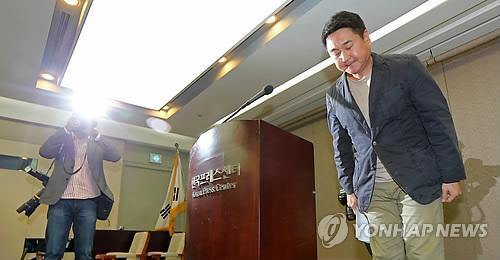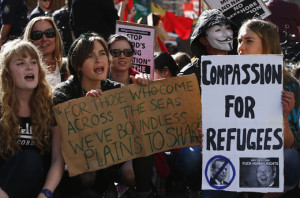By Hojin Choi
Impunity Watch Reporter, Asia
SEOUL, South Korea – On October 13, Lee Sirgoo, the co-CEO of a South Korean company “Daum Kakao,” held a press conference in Seoul, South Korea. He bowed in apology and said that “we stopped accepting prosecution warrants to monitor our users’ private conversations from October 7, and hereby announce that we will continue to do so.” He said that the company will make privacy the top priority of its business when there is discord between privacy and law and added that “if our decision is a violation of the law, I, as the head of Daum Kakao, will bear any responsibilities.” What’s happening in Korea?

The Daum Kakao is a company that operates Kakao Talk messenger application. The Kakao Talk is a dominant application in South Korea with 35 million users out of 50 million of the country’s total population. Most cell phone users now communicate with each other through Kakao Talk rather than mere text messaging, and the term “Ka Talk” has already become synonymous with “sending message via phone.”
The controversial issue arose when the South Korean president, Park Geun-hye, announced in late September that she was cracking down on the spread of baseless and insulting rumors about the president’s personal life. She complained that such rumors in SNS and on websites are socially divisive and destructive.
South Korean Prosecutor’s Office reacted to the president’s anger immediately. Within two days of the president’s comments, the office held a meeting with social media companies, such as Daum Kakao, Naver, and Nate, and also with other government offices like the Ministry of Security and Public Administration, police departments, and the Korea Communications Commission. As a result, the office officially announced that they will “preemptively respond” to spreading false information over the web by “constant monitoring” the SNS and messenger services. About seven days later, the office launched a special team for the task under the Prosecutors’ Office.
The public erupted into a fury and obvious anxiety. Even worse, a newspaper allegedly introduced a case in which the Daum Kakao recently handed to the Prosecutor’s Office the information of three thousand people’s messages and profiles in relation to an investigation on only one person. The company and the office both denied the article, but the company admitted that the Prosecutor’s Office and the nation’s information bureau regularly request information (conversations between users) through warrants.

Based on a long history of distrust of governmental authority since the nation’s military dictatorship, the public started leaving the Kakao Talk and seeking for a “digital asylum.” So far, over 400,000 users have deserted the service, and, within a week, 1.5 million Koreans newly joined a German messenger application, Telegram. This application has no server in Korea and its functions are focused on privacy security. Accordingly, the app encrypts conversations between users and also has a function that automatically deletes the messages a moment after users read them. Now, the forerunner company of Daum Kakao, Daum Communications, is also suffering in the stock market as well as losing its users. The stock fell by over 20% in just three days.
Considering these side effects, the company made the decision not to obey law enforcement by ignoring warrants and compliance requests. The co-CEO of Daum Kakao, Lee Sirgoo, announced regrets that “Daum Kakao failed to understand such anxiety of users of Kakao Talk, bringing the issue to the current state.” He also announced further efforts to regain users’ trust by promoting privacy protections. The company will form an “Information Protection Advisory Committee” composed of outside professionals and modify its message-storage policy, such as reducing from 7 to 2-3 days of keeping users’ conversations in its server and encrypting them.
For more information please see:
YONHAP NEWS – Daum Kakao apologizes over security controversy – 13 October 2014
The Wall Street Journal – Maker of Korean Chat App to Ignore Legal Demands for Users’ Messages – 13 October 2014
Gadgets – Korea’s Kakao Talk Vows to Protect User Privacy – 13 October 2014
BBC – Why South Koreans are fleeing the country’s biggest social network – 9 October 2014
BBC – akao Talk says ‘no’ to South Korean government demands – 14 October 2014
Malaymail – Privacy before law, vows South Korea’s Kakao Talk – 14 October 2014

